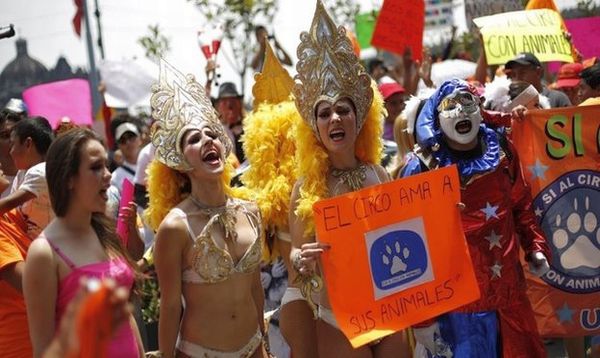Mexico City, Mexico – More than 1,000 acrobats, clowns, and other circus employees marched through downtown Mexico City on Tuesday to protest a new ban on animals in circuses. There can be no lions or tigers or bears — not even dogs or horses — in circus rings under a law passed without opposition in the city legislature Monday. Penalties include fines ranging from $45,000 to $60,000.
Circus performers say the law will leave both animals and humans unemployed. "Hundreds of families are going to be out of work," said Julio Cesar Ramirez, 33, a blue-suited clown and fourth generation circus worker. "This is a tradition that goes back 250 years."
Holding signs reading "Mexico Wants Circuses With Animals!" and "Circuses Love Their Animals," ranks of clowns lined up while acrobats performed on truck-drawn trampolines and scantily-clad female performers sauntered along in feathered headdresses. They paraded plastic animal statues on flat-bed trucks, to show what the circus would look like without live animals.
Armando Cedeno, president of the national circus association, said the measure will affect about 50,000 circus employees and 3,000 to 3,500 animals, mainly elephants, tigers, camels, and hippos. "It is impossible to take these animals back to their natural habitat, because they would die," he said.
 |
He said each tiger, for example, eats three or four chickens per day, costing about $20. "If someday the government expropriates our animals, they're not going to have the money to keep them, and if they have the money, it would be better spent on feeding children living in the street."
Supporters of the measure say the relentless training, constant movement in enclosed vehicles, and frequent performances hurt the animals. They argue that circuses, like Canada's Cirque du Soleil, can be successful without animal acts. But Aurora Vazquez, a member of Mexico's most prominent circus clan, said customers in Mexico's heavily child-oriented market won't even come to circuses without animals.
"The first thing people ask is 'do you have animals?' And if you don't have animals, they won't come," said Vazquez. The city of 9 million follows several other Mexican cities and states in banning circus animal acts, though the measure passed Monday does not apply to shows with dolphins or bullfighting, nor does it prohibit the use of animals in Mexico's traditional rodeos.
Circuses will be given one year to change their acts, but Cedeno fears the ban could go nation-wide at some point. "If they really enact a nationwide ban in Mexico, the circuses will die," he said.
Original Story


